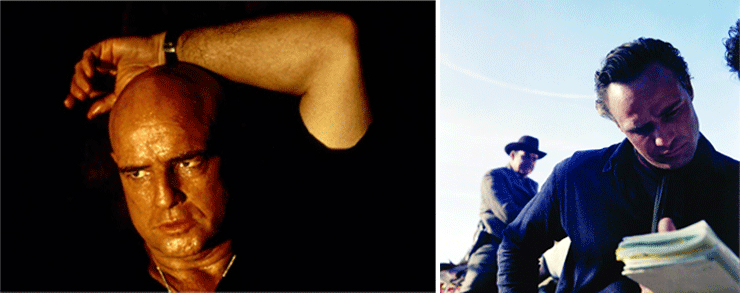
LEFT: Marlon Brando, RIGHT: Posing with his father, Marlon Brando Sr.
Is it possible for a film to dive too far down the rabbit hole of its subject?
Sitting through Listen to Me Marlon, an intimate portrait of the screen icon relying primarily on private audio recordings the Oscar-winning actor recorded for himself, one appreciates the candor of the introspective testimony. And yet, I found myself walking away with the nagging feeling there was a chunk of the jigsaw puzzle missing from this brooding, morose documentary.
How well you respond to director Stevan Riley's admirable yet curiously limiting decision to bypass some of the more conventional trappings of a biographical doc talking-head interviews, omniscient voiceover narration – will highly depend on how well you acclimate to the movie's stream-of-consciousness structure. The film's title spells out the purpose of Brando's recordings: a form of self-therapy and even, in some instances, self-hypnosis that nevertheless doubles as autobiography. One often hears the actor talking to himself, and it's not difficult to conjure up the mental image of the older, heavy-set Brando addressing his studly younger self, the one that raised heartbeats and steamed up the screen in films like The Wild One and A Streetcar Named Desire.

Marlon Brando
Listen to Me opens with haunting digitized images of the older Brando, one second lamenting what he suspects is the impending replacement of flesh-and-blood actors with their virtual counterparts, then reciting a passage from Shakespeare's Macbeth. Even in his twilight, his lilting tenor draws the viewer in effortlessly. Riley then abruptly flashes forward to news coverage of the fatal May 1990 shooting of Dag Drollet, the boyfriend of Marlon's daughter Cheyenne, during a dispute with her half-brother Christian. The film then doubles back to Marlon's upbringing in Omaha, Nebraska and works its way toward returning to that tragic event. In between a more or less chronological look at his meteoric rise to stardom, Riley inserts anecdotes that trace Brando's dysfunctional relationship with his parents, Marlon Sr. and Dorothy, the latter of whom Brando bluntly calls “the town drunk.”
Even more arresting is Brando's relationship with acting guru Stella Adler, an instrumental figure in the development of his craft before he became the poster boy for Method acting. Listen to Me Marlon thrives when simply allowing its subject to impart golden nuggets of acting for the camera. (On closeups: “Your face becomes the stage.”) Much like Riley is attempting to uncover what made the reclusive actor tick, Brando was always searching for “the truth” in his performances, and he is unsparing in his self-criticism of projects that he felt failed to measure up to his standards. A preferred punching bag, for example, is his Mutiny on the Bounty director Lewis Milestone, with whom he clashed on that film's Tahiti set even as the actor fell in love with the Polynesian island.

Marlon Brando
Listen to Me Marlon, however, is astonishingly anemic in the Hollywood dish department. His rocky marriages are barely covered, and even more disappointingly, there is zero mention that his voracious sexual appetite reportedly extended to men as well. It's as if Riley was so awed by the access he's been granted with these tapes that he deemed it sufficient fit to stay inside Brando's head. That's the film strongest asset, because it forces viewers see the world through Brando's eyes, as well as its chief liability, because its focus becomes a prison for the viewer seeking a more comprehensive portrayal. The wall-to-wall soundtrack, relying too heavily on classical music even when, one may argue, it hardly fits what's showing on screen, enhances the sensation of being trapped in a department store elevator.
Still, the film merits a look, especially for its valuable behind-the-scenes look at Brando's work in two of his best films: Last Tango in Paris and Apocalypse Now. “He wanted me to be me,” Brando says about Tango auteur Bernardo Bertolucci. Perhaps this part of Listen to Me Brando works as well as it does because it integrates Bertolucci's own audio recording of his own experience working with the demanding thespian, thus achieving a balance in a film that could have used more of that evenhandedness.
<blockquote>Listen to Me Marlon starts Friday, Aug. 28 at the Tower Theater, Cinema Paradiso Fort Lauderdale and Living Room Theaters in Boca Raton. It also plays Aug. 28-30 at O Cinema Miami Shores.




